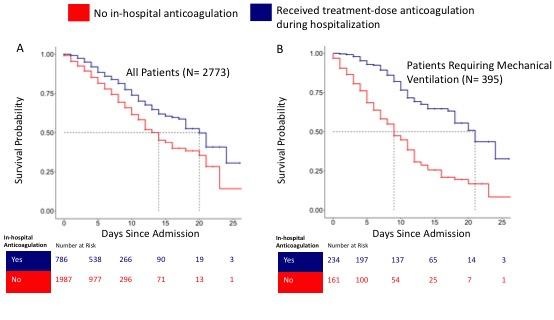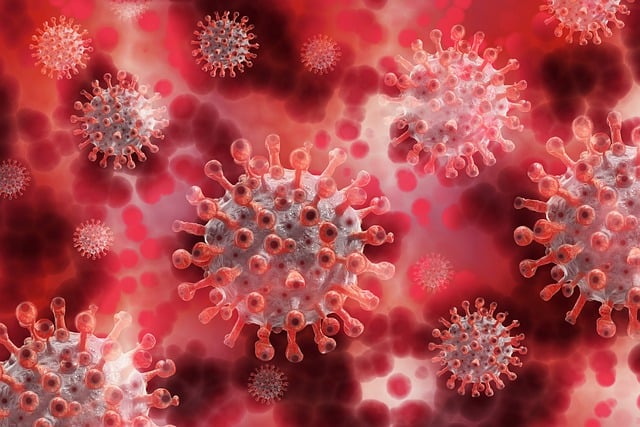Treating hospitalized COVID-19 patients with blood thinners may improve their chances of survival, researchers at the Mount Sinai COVID Informatics Center report. The study, published in the Journal of the American College of Cardiology , could provide new insight into how to treat and manage coronavirus patients once they are admitted to the hospital.
The study found that hospitalized COVID-19 patients treated with blood thinners had improved outcomes both inside and outside the intensive care unit. The research also showed that the difference in bleeding events between patients treated with and without anticoagulants was not significant.
The Mount Sinai researchers say their work describes an important therapeutic avenue for patients with COVID-19.
"This research demonstrates that anticoagulants taken orally, subcutaneously or intravenously can play an important role in the care of patients with COVID-19, and these can prevent potential fatal events associated with the coronavirus, including heart attack, stroke and pulmonary embolism," says corresponding author Valentin Fuster, MD, PhD, Director of Mount Sinai Heart (the nation’s number six hospital for Cardiology/Cardiac Surgery) and physician-in-chief of Mount Sinai Hospital.
| "The use of anticoagulants should be considered when patients are admitted to the emergency room and have tested positive for COVID-19 to possibly improve outcomes. However, each case should be evaluated on an individualized basis to take into account the potential risk of bleeding." . |
The publication of this study follows recent research from the Icahn School of Medicine at Mount Sinai showing that a large number of hospitalized patients with COVID-19 have developed high levels of life-threatening blood clots , leading to life-threatening thromboembolic events.
A team of researchers evaluated the records of 2,773 confirmed COVID-19 positive patients admitted to five Mount Sinai Health System hospitals in New York City (The Mount Sinai Hospital, Mount Sinai West, Mount Sinai Morningside, Mount Sinai Queens and Mount Sinai Brooklyn) between March 14 and April 11, 2020.
They specifically looked at the survival rates of patients who received anticoagulants versus those who did not receive anticoagulants. The researchers took into account certain risk factors before evaluating the effectiveness of anticoagulation, including age, ethnicity, pre-existing conditions, and those already on anticoagulants.
Of the COVID-19 patients analyzed, 786 (28 percent) received a full dose of blood thinners for treatment, a dose higher than that usually given for blood clot prevention, and one that is usually given to those who already have clots or are suspected of having clots.

Kaplan-Meier curve for hospitalized patients with COVID-19 (A) and those requiring invasive mechanical ventilation (B). Colors indicate anticoagulation with treatment doses. Patients were correctly censored if they were hospitalized at the time of data freezing or discharged within the study period.
Anticoagulant treatment was associated with improved hospital survival among COVID-19 patients, both in and out of the intensive care unit.
Of the patients who did not survive, those on anticoagulants died after spending an average of 21 days in the hospital, compared with patients without anticoagulants who died after an average of 14 days in the hospital.
The effect of anticoagulation was more pronounced in ventilated patients : 62.7 percent of intubated patients who were not treated with anticoagulants died, compared with 29.1 percent of intubated patients treated with anticoagulants.
Of the intubated patients who did not survive, those without anticoagulants died after 9 days, while those on anticoagulants died after 21 days.
All patients in the study had blood tests when they arrived at the hospital, which included measurement of several inflammatory markers . Analysis of their records showed that patients receiving anticoagulants had higher inflammatory markers compared to patients not treated with anticoagulants. This may suggest that patients with more severe illness may benefit from anticoagulants early on.
The observational study also explored the association of systemic anticoagulant treatment with bleeding events .
Major bleeding was defined as 1) hemoglobin <7 g/dL and any red blood cell transfusion; 2) at least 2 units of red blood cell transfusion in 48 hours; or 3) a diagnosis code for major bleeding, including intracranial hemorrhage; hematemesis melena peptic ulcer with hemorrhage; bleeding from the colon, rectum or anal; hematuria ocular hemorrhage; and acute hemorrhagic gastritis.
Among those who did not receive anticoagulants, 38 (1.9 percent) patients had bleeding events, compared with 24 (3 percent) among those who received anticoagulants, p = 0.2).
"We hope that this report of the association of anticoagulant therapy with improved survival will be confirmed in future research. Astute scientists at Mount Sinai continue to analyze our data on COVID-19 patients to contribute to global efforts to find effective treatments," says David Reich, MD, president and chief operating officer of Mount Sinai Hospital.
"As a cardiologist who has been on duty caring for COVID-19 patients for the past three weeks, I have seen an increase in the number of cases of blood clots among hospitalized patients, so it is essential to see if blood thinners provide benefits to them" . says co-investigator Anu Lala, MD, Assistant Professor of Medicine (Cardiology) at the Icahn School of Medicine at Mount Sinai. "It is important to note that further analysis and prospective studies are required to determine the effectiveness of widespread use of anticoagulants in hospitalized patients with COVID-19."
"This study is opening the door to a larger study that will be carried out with 5,000 COVID-19 positive patients, where we will evaluate the effectiveness of three types of antithrombotic therapy: oral antithrombotic, subcutaneous heparin and intravenous heparin. -and then such compromise our data for prospective clinical trials," says lead author Girish Nadkarni, MD, co-director of the Mount Sinai COVID Informatics Center. "We are excited about these preliminary results that may have a positive impact on COVID-19 patients and potentially give them a higher chance of survival, although more studies are needed."
















